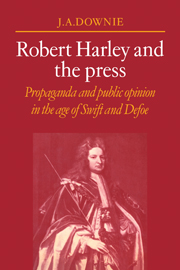Book contents
- Frontmatter
- Contents
- Preface and Acknowledgements
- Author's note
- Introduction
- Part one 1689–1708
- Part two 1708–1714
- 5 The tory resurrection, 1708–1710
- 6 Swift, Defoe, and the peace campaign
- 7 The stamp act of 1712
- 8 The organisation of propaganda, 1710–1714
- Epilogue: impeachment and after
- Abbreviations
- Notes
- Index
7 - The stamp act of 1712
Published online by Cambridge University Press: 07 October 2011
- Frontmatter
- Contents
- Preface and Acknowledgements
- Author's note
- Introduction
- Part one 1689–1708
- Part two 1708–1714
- 5 The tory resurrection, 1708–1710
- 6 Swift, Defoe, and the peace campaign
- 7 The stamp act of 1712
- 8 The organisation of propaganda, 1710–1714
- Epilogue: impeachment and after
- Abbreviations
- Notes
- Index
Summary
The institution in 1712 of a stamp duty on pamphlets and newspapers by the Oxford ministry marks a crucial change in government thinking about the press. A return to press regulations did not take place. The stamp act – an entirely new piece of legislation – continued in operation until 1885. Walpole retained his predecessor's measure, increasing the levy, and he was imitated by successive governments throughout the eighteenth and nineteenth centuries until it reached a maximum of fourpence on all newspapers. Advertisements, taxed in Oxford's original duty, were subject to particularly heavy tolls. This was a far cry from the halfpenny tax imposed by the Oxford ministry in 1712, but the solution to the problem of maintaining some sort of control over the press which was worked out under Oxford, if not by him, was the foundation of the new system. The licensing system, as it turned out, had finally been superseded by a different attitude towards literature, which attempted not to suppress it, but to exploit its popularity.
The break with the past is more striking than merely this, however, for the Oxford ministry deliberately and determinedly blocked more repressive steps to reintroduce press regulations. When the house of commons, in April 1695, refused to concur with the demands of the Lords for a renewal of the licensing system, the reasons given were based on the assumption that the act was ‘a law which in no wise answered the end for which it was made’.
- Type
- Chapter
- Information
- Robert Harley and the PressPropaganda and Public Opinion in the Age of Swift and Defoe, pp. 149 - 161Publisher: Cambridge University PressPrint publication year: 1979



